
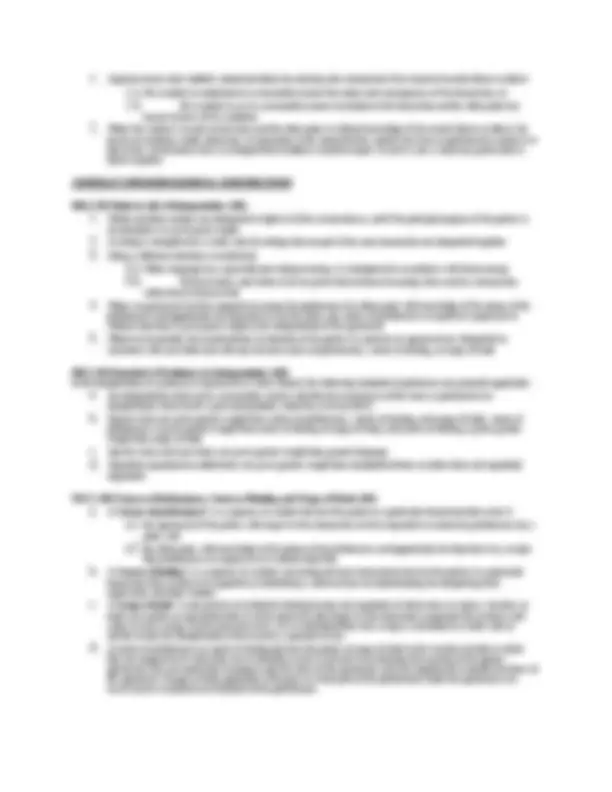
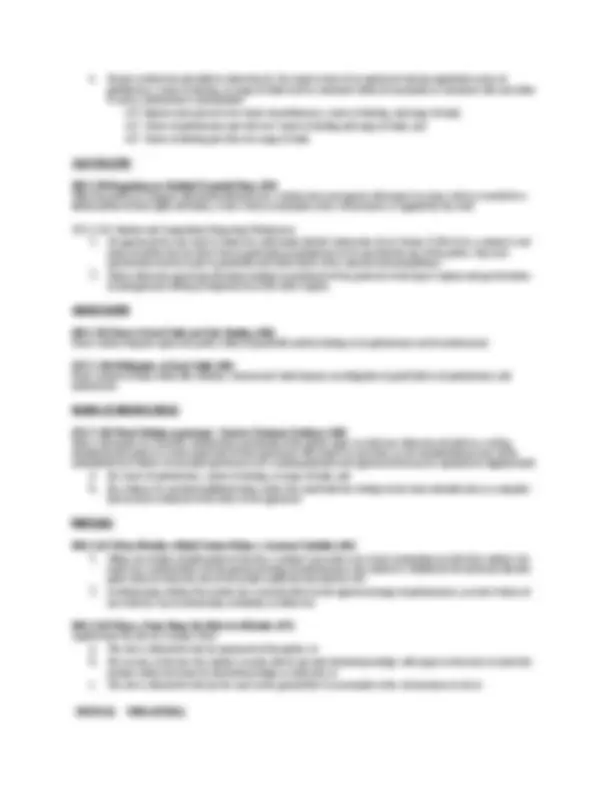
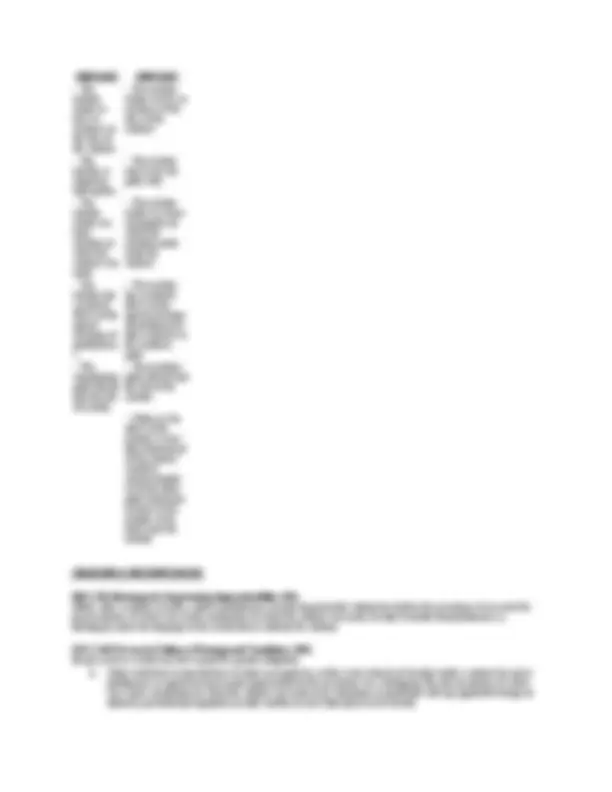
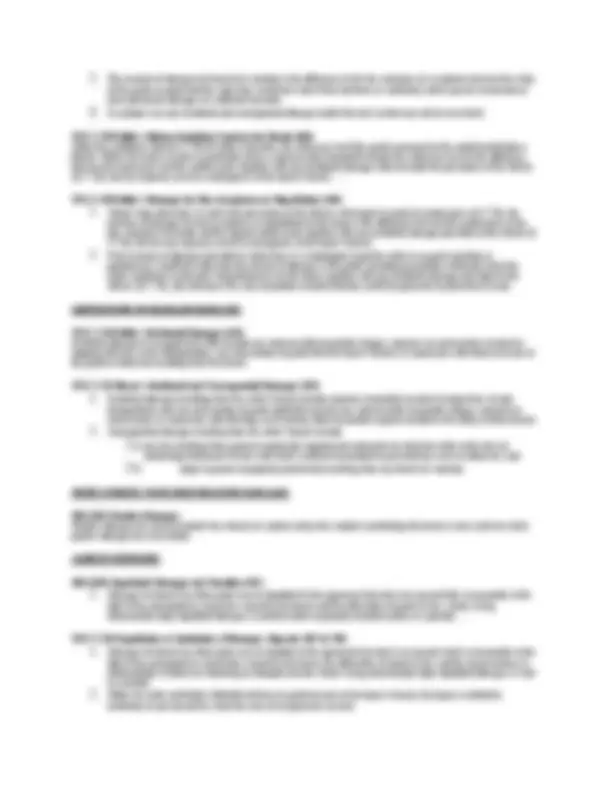
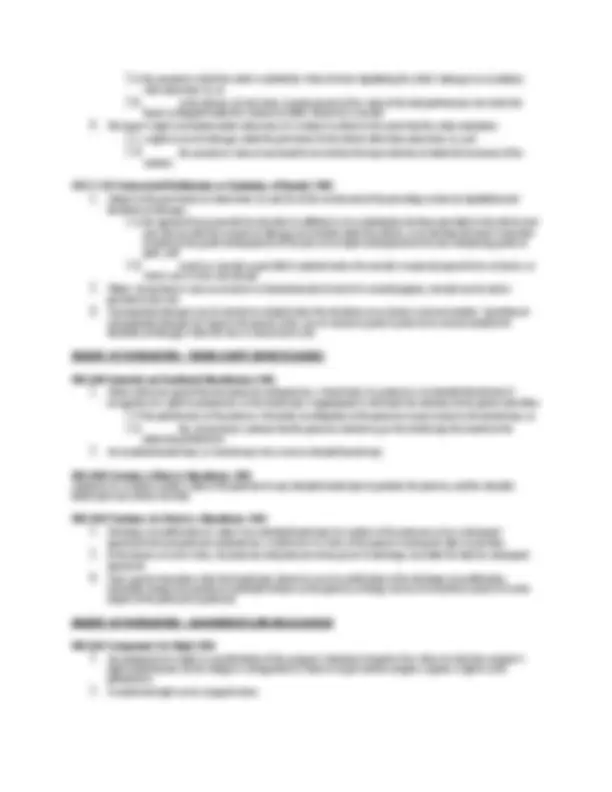
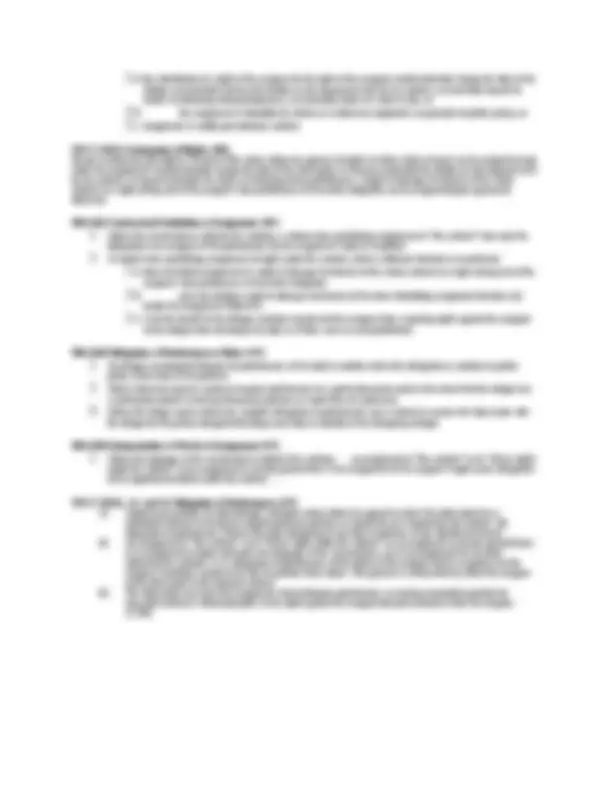


Study with the several resources on Docsity

Earn points by helping other students or get them with a premium plan


Prepare for your exams
Study with the several resources on Docsity

Earn points to download
Earn points by helping other students or get them with a premium plan
Community
Ask the community for help and clear up your study doubts
Discover the best universities in your country according to Docsity users
Free resources
Download our free guides on studying techniques, anxiety management strategies, and thesis advice from Docsity tutors
Complete R2d and UCC for entire Contracts II - Hatcher 2017 semester as prepared for the final exam
Typology: Study notes
1 / 10

This page cannot be seen from the preview
Don't miss anything!







Restatement and UCC
R2d § 87 Option Contract (?)
proposes an exchange on fair terms within a reasonable time; or
part of the offeree before acceptance and which does induce such action or forbearance is binding as an option contract to the extent necessary to avoid injustice
UCC § 2-205 Firm Offer (393) An offer by a merchant to buy or sell goods in a signed writing which by its terms gives assurance that it will be held open is not revocable, for lack of consideration, during the time stated or if no time is stated for a reasonable time, but in no event may such period of irrevocability exceed three months; but any such term of assurance on a form supplied by the offeree must be separately signed by the offeror.
R2d § 86 Promise for Benefit Received (417)
extent necessary to prevent injustice
or
R2d § 164 When a Misrepresentation Makes a Contract Voidable (424)
upon which the recipient is justified in relying, the contract is voidable by the recipient.
R2d § 162 When a Misrepresentation is Fraudulent or Material (424)
maker
knows that it would be likely to induce the recipient to do so.
R2d § 160 When Action is Equivalent to an Assertion (Concealment) (424) Action intended or known to be likely to prevent another from learning a fact is equivalent to an assertion that the fact does not exist.
R2d § 161 When Non-Disclosure is Equivalent to an Assertion (434) A person’s non-disclosure of a fact known to him is equivalent to an assertion that the fact does not exist in the following cases only:
misrepresentation or from being fraudulent or material
that party is making the contract and if non-disclosure of the fact amounts to a failure to act in good faith and in accordance with reasonable standards of fair dealing
writing, evidencing or embodying an agreement in whole or in party
R2d § 175 When Duress by Threat Makes a Contract Voidable (459)
reasonable alternative, the contract is voidable by the victim
R2d § 176 When a Threat is Improper (459)
property
unfair dealing by the party making the threat, or
UCC 2-209 Modification, Rescission and Waiver (478)
or rescinded, but except as between merchants such a requirement on a form supplied by the merchant must be separately signed by the other party
within its provisions
UCC 2-302 Unconscionable Contract or Clause (482)
was made the court may refuse to enforce the contract, or it may enforce the remainder of the contract without the unconscionable clause, or it may so limit the application of any unconscionable clause as to avoid any unconscionable result
shall be afforded a reasonable opportunity to present evidence as to its commercial setting, purpose and effect to aid the court in making the determination
R2d § 208 Unconscionable Contract or Term (483) If a contract or term thereof is unconscionable at the time the contract is made a court may refuse to enforce the contract, or may enforce the remainder of the contract without the unconscionable term, or may so limit the application of any unconscionable term as to avoid any unconscionable results.
R2d § 15 Mental Illness or Defect (550)
performance, course of dealing, or usage of trade must be construed whenever reasonable as consistent with each other. If such a construction is unreasonable:
R2d § 204 Supplying an Omitted Essential Term (598) When the parties to a bargain sufficiently defined to be a contract have not agreed with respect to a term which is essential to a determination of their rights and duties, a term which is reasonable in the circumstances is supplied by the court.
UCC 2-311 Options and Cooperation Respecting Performance
made invalid by the fact that it leaves particulars of performance to be specified by one of the parties. Any such specification must be made in good faith and within limits set by commercial reasonableness.
or arrangements relating to shipment are at the seller’s option
R2d § 205 Duty of Good Faith and Fair Dealing (608) Every contract imposes upon each party a duty of good faith and fair dealing in its performance and its enforcement
UCC 1-304 Obligation of Good Faith (608) Every contract or duty within [the Uniform Commercial Code] imposes an obligation of good faith in its performance and enforcement.
UCC 2-202 Final Written expressions: Parol or Extrinsic Evidence (648) Terms with respect to which the confirmatory memoranda of the parties agree or which are otherwise set forth in a writing intended by the parties as a final expression of their agreement with respect to such terms as are included therein may not be contradicted by evidence of any prior agreement or of a contemporaneous oral agreement but may be explained or supplemented
and exclusive statement of the terms of the agreement
R2d § 152 When Mistake of Both Parties Makes a Contract Voidable (669)
made has a material effect on the agreed exchange of performances, the contract is voidable by the adversely affected party unless he bears the risk of the mistake under the rule stated in 154.
any relief by way of reformation, restitution, or otherwise.
R2d § 154 When a Party Bears the Risk of a Mistake (679) A party bears the risk of a mistake when
mistake relates but treats his limited knowledge as sufficient, or
R2d § 261 Discharge by Supervening Impracticability (695) Where, after a contract is made, a party’s performance is made impracticable without his fault by the occurrence of an event the non-occurrence of which was a basic assumption on which the contract was made, his duty to render that performance is discharged, unless the language or the circumstances indicate the contrary.
UCC 2-615 Excuse by Failure of Presupposed Conditions (698) Except so far as a seller may have assumed a greater obligation
performance as agreed has been made impracticable by the occurrence of a contingency the non-occurrence of which was a basic assumption on which the contract was made or by compliance in good faith with any applicable foreign or domestic governmental regulation or order whether or not it later proves to be invalid
(1) A contract for sale imposes an obligation on each party that the other’s expectation of receiving due performance will not be impaired. When reasonable grounds for insecurity arise with respect to the performance of either party the other may in writing demand adequate assurance of due performance and until he receives such assurance may if commercially reasonable suspend any performance for which he has not already received the agreed return.... (4) After receipt of a justified demand failure to provide within a reasonable time not exceeding thirty days such assurance of due performance as is adequate under the circumstances of the particular case is a repudiation of the contract.
R2d § 344 Purposes of Remedies (799) Judicial remedies under the rules stated in the Restatement serve to protect one or more of the following interest of a promisee:
as he would have been in had the contract been performed,
put in as good a position as he would have been in had the contract not been made, or
party
R2d §347 Measure of Damages in General (811) Subject to the limitations stated in §§ 350-53, the injured party has right to damages based on his expectation interest as measured by
UCC 1-305(a) Remedies to be Liberally Administered (834) The remedies provided by [the Uniform Commercial Code] must be liberally administered to the end that the aggrieved party may be put in as good a position as if the other party had fully performed but neither consequential or special damages nor penal damages may be had except as specifically provided in the UCC or by other rule of law.
UCC 2-712 “Cover”; Buyer’s Procurement of Substitute Goods (837)
purchase of or contract to purchase goods in substitution for those due from the seller.
together with any incidental or consequential damages as hereinafter defined (§ 2-715), but less expenses saved in consequence of the seller’s breach.
UCC 2-713 Buyer’s Damages for Non-Delivery or Repudiation (837)
non-delivery or repudiation by the seller is the difference between the market price at the time when the buyer learned of the breach and the contract price together with any incidental and consequential damages provided in this Article (§ 2-715), but less expenses saved in consequence of the seller’s breach.
acceptance, as of the place of arrival.
UCC 2-714 Buyer’s Damages for Breach in Regard to Accepted Goods (841)
any non-conformity of tender the loss resulting in the ordinary course of events from the seller’s breach as determined in any manner which is reasonable.
of the goods accepted and the value they would have had if they had been as warranted, unless special circumstances show proximate damages of a different amounts.
UCC 2-706 Seller’s Release Including Contract for Resale (843) Under the conditions stated in 2-703 on seller’s remedies, the seller may resell the goods concerned or the undelivered balance thereof. Where the resale is made in good faith and in a commercially reasonable manner the seller may recover the difference between the resale price and the contract price together with any incidental damages allowed under the provisions of this Article (§ 2-710), but less expenses saved in consequence of the buyer’s breach....
UCC 2-708 Seller’s Damages for Non-Acceptance or Repudiation (843)
measure of damages for non-acceptance or repudiation by the buyer is the difference between the market price at the time and place for tender and the unpaid contract price together with any incidental damages provided in this Article (§ 2-710), but less any expenses saved in consequence of the buyer’s breach.
performance would have done then the amuser of damages is the profit (including reasonable overhead) which the seller would have made from full performance by the buyer, together with any incidental damages provided in this Article (§ 2-710), due allowance for costs reasonable incurred and due credit for payments or proceeds of resale.
UCC 2-710 Seller’s Incidental Damages (878) Incidental damages to an aggrieved seller include any commercially reasonable charges, expenses or commissions incurred in stopping delivery, in the transportation, care and custody of goods after the buyer’s breach, in connection with return or resale of the goods or otherwise resulting from the breach.
UCC 2-715 Buyer’s Incidental and Consequential Damages (878)
transportation and care and custody of goods rightfully rejected, any commercially reasonable charges, expenses or commissions in connection with effecting cover and any other reasonable expense incident to the delay or other breach.
contracting had reason to know and which could not reasonably be prevented by cover or otherwise; and
R2d §355 Punitive Damages Punitive damages are not recoverable for a breach of contract unless the conduct constituting the breach is also a tort for which punitve damages are recoverable.
R2d §356 Liquidated Damages and Penalties (897)
light of the anticipated or actual loss caused by the breach and the difficulties of proof of loss. A term fixing unreasonably large liquidated damages is unenforceable on grounds of public policy as a penalty...
UCC 2-718 Liquidation or Limitation of Damages; Deposits (897 & 936)
light of the anticipated or actual harm caused by the breach, the difficulties of proof of loss, and the inconvenience or nonfeasibility of otherwise obtaining an adequate remedy. A term fixing unreasonably large liquidated damages is void as a penalty.
restitution of any amount by which the sum of his payments exceeds
obligor, or materially increase the burden or risk imposed on him by his contract, or materially impair his chance of obtaining return performance, or materially reduce its value to him, or
UCC 2-210(2) Assingment of Rights (960) Except as otherwise provided in Section 9-406, unless otherwise agreed, all rights of either seller or buyer can be assigned except where the assignment would materially change the duty of the other party, or increase materially the burden or risk imposed on hi by his contract, or impair materially his chance of obaining return performance. A right to damages for breach of the whole contract or a right arising out of the assignor’s due performance of his entire obligation can be assigned despite agreement otherwise.
R2d §311 Contractual Prohibition of Assignment (967)
delegation to an assignee of the performance by the assignor of a duty or condition
assignor’s due performance of his entire obligation
render the assignment ineffective
or the obligor from dischargin his duty as if there were no such prohibition
R2d §318 Delegation of Performance of Duty (972)
policy or the terms of his promise
a susbstantial interest in having that person perform or control the acts promised.
the obligor by the person delegated discharges any duty or liability of the delegating obligor.
R2d §328 Interpretation of Words of Assignment (972)
under the contract” or an assignment in similar general terms is an assignment of the assignor’s rights and a delegation of his unperfomred duties under the contract....
UCC 2-210(1), (5), and (6) Delegation of Performance (972) (1) A party may perform his duty through a delegate unless otherwise agreed or unless the other party has a substantial interest in having his original promisor perform or control the acts required by the contract. No delegation of performance relieves the party delegating of any duty to perform or any liability for breach.... (5) An assignment of “the contract” or of “all my rights under the contract” or an assignment in similar general terms in as assignment of rights and unless the language or the circumstnaces (as in an assignment for security) indicating the contrary, it is a delegation of performance of the duties of the assignor and its acceptance by the assignee constitutes a promise by him to perform those duties. This promise is enforceable by either the assignor or the other party to the originial contract. (6) The other party may treat any assignment which delegates performance as creating reasonable grounds for insecurity and may without prejudice to his rights against the assignor demand assurances from the assignee (2-206).